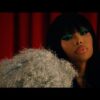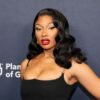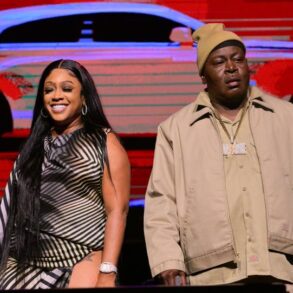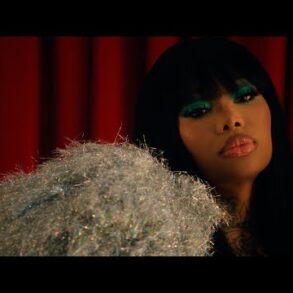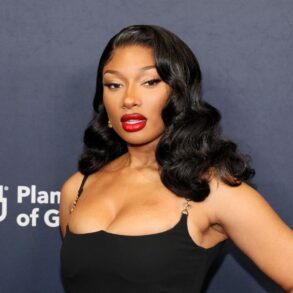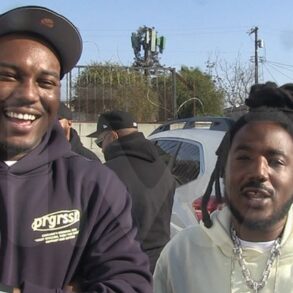For filmmaker dream hampton, the story of women in hip-hop is not one of easily packaged girl power over tight beats. It’s pioneer Roxanne Shanté primping with her girls in a ladies’ room in Manhattan’s Latin Quarter, then the nerve center of the hip-hop’s club scene, minding her business when “The Bridge is Over” drops.
This was about two decades ago. Before cellphones were a given. Before a celebrity run-in had to be documented or it didn’t happen. So hampton, whose latest docuseries “Ladies First: A Story of Women in Hip-Hop” was just released on Netflix, wasn’t in fan mode. She clocked the female MC’s presence and prepared to move on. That’s when both women heard the unmistakable drum beats of KRS-One’s classic diss record and its unforgettable line, “Roxanne Shanté is only good for steady f—ing.” She was 16 when that record hit.
On the 1987 track, a then 21-year-old KRS spends two minutes hurling schoolyard insults at the Juice Crew, the Queens collective founded by DJ Marley Marl which included Mr. Magic, MC Shan, and Shanté. A South Bronx rapper lyrically planting the flag in his borough, KRS calls into question the other crew’s cred, calling them boring, fake and gay. But what he said about Shanté sliced deeper, especially considering how many packed crowds screamed out the lyrics at the top of their lungs.
Because here’s the thing. The DJ that night most likely knew Shanté was in the building. They always do. J. Lo walks in then suddenly everybody on the dance floor is subject to “Waiting for Tonight.” Will Smith rolls through and it’s “Gettin’ Jiggy With It.” So when Shanté, who shot to fame at 14 with “Roxanne’s Revenge,” steps in the club the DJ knew about it. But instead of paying homage he played a song that reduced her indisputable talent to her parts.
“I’m so sorry,” hampton told Shanté that night with “The Bridge is Over” playing in the background. “I remember her like catching my eyes and just saying, ‘Thank you.’” After that Shanté left the club altogether, recalled hampton. The encounter, brief as it was, became emblematic.
“That to me is how hip-hop treats its women,” said hampton.
It’s the erasure — that rewriting of history — that hampton and the other executive producers of “Ladies First: A Story of Women in Hip-Hop” sought to correct, filling the story of hip-hop with the women who’ve been there since day one. Literally. That 1973 back-to-school jam deejayed by DJ Kool Herc that marks the beginning of the genre? It was his sister Cindy’s party.
As a writer, filmmaker and producer, hampton, who’d first made her mark on hip-hop while writing for a still nascent The Source magazine, has made a career of holding feet to the fire. After joining The Source as a 19-year-old photo editor, the first opinion piece she wrote for the publication in 1991 took NWA’s Dr. Dre to task for assaulting journalist Dee Barnes (Dre pleaded no contest to misdemeanor battery in connection to the 1991 incident). She told Tupac he couldn’t rap. Called Jay-Z a capitalist (and also co-wrote his memoir “Decoded”). Then in 2019 as executive producer of the record-breaking Lifetime docuseries “Surviving R. Kelly,” hampton’s work ignited renewed national interest in Kelly’s crimes against young women. He is now serving nearly 30 years in prison for child sex abuse, sex trafficking and racketeering.
And yet despite hampton’s history with the music, when producers Raeshem Nijhon and Carri Twigg initially asked her to join “Ladies First,” her first answer was “no but good luck and have fun.”
But Nijhon and Twigg persisted.
“I was just going to bring the darkness,” hampton said of how she initially saw her role. She questioned how revolutionary hip-hop could be with “broken gender politics.” Stories about abuse, prison, the mommy ceiling and forgotten credits. But, she added, there has never been a more exciting time for women in hip-hop than right now, and men weren’t going to tell their stories. “Culture House was willing to complicate it,” said hampton, who directed the third episode in the series. “When it was all said and done, I had to text Rae and Carri and thank them because I’m so proud of what we ended up doing.”
This interview has been condensed and edited for clarity.
Q: Tell me about your early days at The Source.
A: It’s been over overstated. I worked at the Source for 18 months when I was 19. I wasn’t Kim Osorio [the magazine’s first female editor in chief]. I was the photo editor. I was the only woman in the office. It was literally me and a bunch of guys. Later, I wrote two seminal pieces in my magazine writing career, which all happened in the last century, on Snoop and Tupac. And even then I got those pieces because they didn’t know who they wanted to be. They were so East Coast. Just being from the Midwest I didn’t understand how they didn’t understand, you know? That was emblematic of the whole East Coast. By the time they had lost being the center of hip-hop they didn’t even realize it.
Q: When did you fall in love hip-hop? Or did you ever truly love it?
A: Oh, my God. I loved hip-hop. I don’t know what I heard first, whether it was Apache at the roller skating rink or if it was Bambaataa. But absolutely I loved it and loathed it all at once. Someone asked a question on Twitter, ‘When was the first time you realized or reacted to misogyny in hip-hop?’ And I was like Slick Rick “Treat Her Like a Prostitute”? A Tribe Called Quest’s “The Infamous Date Rape.” There’s no type of hip-hop where it wasn’t problematic. It was always what it was, you know?
Q: Is this why you were hesitant to join “Ladies First”?
A: This isn’t a story of triumph. But I will say that there’s never been a more exciting time for women in hip-hop than right now. That whole one at a time thing, the idea that you had to be embedded in a crew or had to be co-signed by a man? All of that is gone. I have no idea who co-signed Cardi B. If Lil Wayne and them co-signed Nicki it is so far in the rearview of her story, I can barely remember it. Let alone all these other rappers, like Latto, Ice Spice, Chika. I don’t know who they belong to.
Q: Belong? That’s interesting language.
A: It’s a classic feminist question. You have to be claimed in the public space in order to be safe. And particularly when you’re talking about some hyper-masculine arena like hip-hop. These women belong to themselves in this moment, which is so beautiful to me. Back then, when that kind of stuff mattered, Ms. Melodie belonged to KRS-One. Sister Souljah belonged to Public Enemy. Yo-Yo belonged to Ice Cube. And I know they would not like to be described that way, but in the public imagination that’s absolutely what it was.
Q: And yet you’re still here doing this work more than three decades in.
A: I’ve never listened to a Kanye album. So I feel very much not in it. I’ve never listened a Mos Def album and that’s not even new. Let alone knowing the difference between Lil Baby and DaBaby. So now I’m somebody’s mama talking like this, right? When we were writing about the cul — well I don’t think it’s a culture either — but when we were writing about this music we were very much embedded and that mattered to us. I think that’s still a good ethic to have. So for all those reasons, I just didn’t think I was the right fit. I love [producers] Carri and Rae though. They came back and I found a useful place for me to be, which is what I’ve always been in hip-hop — a critic.
Q: You just said something I thought was interesting. Hip-hop is not a culture. What do you mean?
A: I think that culture has food. Hip-hop is another iteration of Black youth culture — a generations long spectrum. It is a genre of music.
Q: Okay, how about a movement?
A: It had the potential to be a movement at a certain point. As [sociologist] Tricia Rose once said in this debate that I was in with her arguing for hip-hop with KRS and Michael Eric Dyson like a clown. I was the clown. When she mopped the floor with us. Tricia called hip-hop the cultural arm of capitalism. I’m never going to forget it. It was so good.
Q: This year marks the 50th anniversary of hip-hop, specifically the 1973 Bronx party Cindy Campbell threw with her brother DJ Kool Herc. There have been more than a few sort of revues, which folks debate over endlessly. How would you rate how the industry has commemorated the moment?
A: In fact that makes me sad about it. Because I grew up in Detroit when the Motown revues were happening and it could be like just one Temptation. So that already means that it’s dead. It’s already in its history phase. We’re putting it in amber. Then Dre gets the Dr. Dre award. So, you know, “What the f — k Grammys?!” They’re attempting to whitewash this, and they don’t need to by the way. Our culture is consumerism. Dee Barnes was on my mind. The Mount Rushmore of hip-hop have all been accused by dozens of people of abuse. And that would be Bambaataa, Russell Simmons and Dr. Dre.
Q: Do you still believe hip-hop is revolutionary? Was it ever?
A: You can’t be a revolutionary with broken gender politics. You can’t be a revolutionary and be homophobic. And this is before we even get to capitalism. To be homophobic, transphobic and misogynist? No, you’re not a revolutionary. You’re not even a radical. You’re actually quite status quo. What it was was a radical sound, and that’s not even true anymore.
Q: I’m thinking of your other documentary, “Fresh Water,” and how it confronts climate change in urban areas. Shouldn’t this be what folks are rapping about too? What’s happening in ignored neighborhoods around the country?
A: I don’t think hip-hop is going to be the start of that kind of expression. Hip-hop is like a couple of generations of Black youth expression. I don’t think it remains. And I could be wrong. But I do think that it’s important to offer “Ladies First” in this moment because the men aren’t going to tell it. You’ll hear someone like Drake say the women are doing the most right now. But for the most part, it goes from Dee Barnes being beat up by Dr. Dre to Meg being shot by Tory. So this is our way of celebrating this moment where it is so clear who’s making the most interesting contributions to this music.
This post was originally published on this site be sure to check out more of their content.


